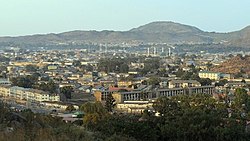
Back Jos Afrikaans جوس Arabic جوس (مدينه فى ولايه بلاتو) ARZ Cos (şəhər) Azerbaijani جوس AZB Джос Byelorussian Jos Catalan Jos (kapital sa estado) CEB Jos Czech Jos Danish
Jos | |
|---|---|
| Jos and Bukuru Metropolis | |
 Hill in the northeastern part of Jos | |
| Nickname: J-Town | |
| Coordinates: 09°55′00″N 08°53′25″E / 9.91667°N 8.89028°E | |
| Country | Nigeria |
| State | Plateau State |
| Government | |
| • Type | Traditional Monarchy (Jos Joint Traditional Council of Chiefs) |
| • Gbong Gwom Jos (Head of Jos Joint Traditional Council of Chiefs [Riyom, Barkin Ladi, Jos-South, Jos-North] & Plateau State Traditional Council of Chiefs, concurrently) | Jacob Gyang Buba (incumbent) |
| Elevation | 1,220 m (4,000 ft) |
| Population (2010) | |
• Total | 622,802 |
| • Rank | 6th |
| GDP (PPP, 2015 int. Dollar) | |
| • Year | 2023 |
| • Total | $6.3 billion[1] |
| • Per capita | $6,500 |
| Time zone | GMT+1 |
| Climate | Aw |
Jos /ˈdʒɔːs/ is a city in the North-Central region of Nigeria. The city has a population of about 900,000 residents based on the 2006 census.[2] Popularly called "J-Town",[3] it is the administrative capital and largest city of Plateau State. The city is situated on the Jos plateau which is lies within the Guinea Savannah of North-Central Nigeria. It connects most of the North-Eastern capitals to the Federal Capital Territory Abuja, by road. Driving in and out of Jos, traffic encounters very steep and windy bends and mountainous sceneries typical of the plateau, from which the state derives its name.
During the period of British colonial rule, Jos became an important centre for tin mining after large deposits of cassiterite, the main ore for the metal, were discovered. It is also the trading hub of Plateau State as commercial activities are steadily increasing.
- ^ "TelluBase—Nigeria Fact Sheet (Tellusant Public Service Series)" (PDF). Tellusant. Retrieved 2024-01-11.
- ^ "Federal Republic of Nigeria : 2006 Population Census" (PDF). Archived from the original (PDF) on March 5, 2012. Retrieved 22 November 2014.
- ^ "j-town". naijalingo.com. Retrieved 2024-07-05.
